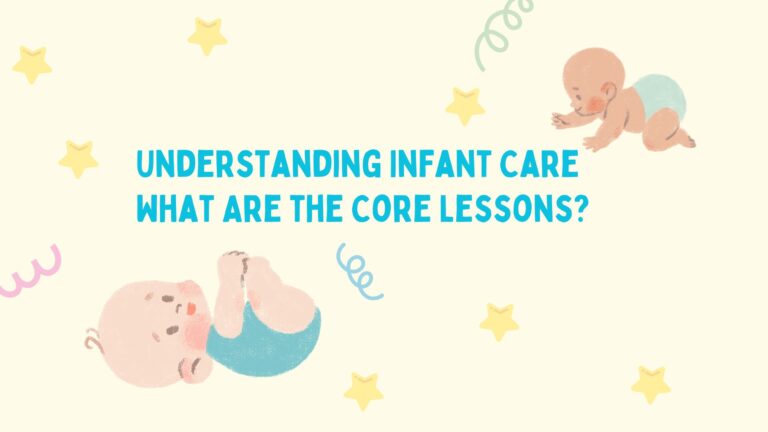Caring for an infant is one of the most rewarding yet challenging experiences. To navigate this journey with confidence, it’s essential to understand the core lessons of infant care. These lessons cover everything from feeding and sleep patterns to safety, hygiene, and emotional bonding. Let’s dive into the foundational aspects of infant care to ensure your little one grows healthy and happy.

1. Feeding: Meeting Your Baby’s Nutritional Needs
Breastfeeding or Formula Feeding
One of the most important aspects of infant care is ensuring your baby gets the right nutrition. Whether you choose breastfeeding or formula feeding, it’s vital to feed your infant on demand, typically every 2-3 hours during the newborn stage.
- Breastfeeding: Provides essential nutrients and antibodies that strengthen your baby’s immune system.
- Formula feeding: Is a healthy alternative that also ensures proper nutrition if breastfeeding is not an option.
Recognizing Hunger Cues
Babies don’t have a set schedule for feeding, so it’s important to learn their hunger signals:
- Lip smacking or sucking on fingers.
- Rooting, where the baby turns their head toward anything that touches their cheek.
- Fussiness or crying, which are late hunger signs.
2. Diapering and Hygiene
Frequent Diaper Changes
Infants need frequent diaper changes to stay comfortable and prevent rashes. On average, a newborn may need to be changed 8-12 times a day. Use gentle wipes and apply diaper cream to prevent irritation.
Bathing Basics
Newborns don’t need daily baths. Instead, 2-3 sponge baths per week are sufficient until the umbilical cord stump falls off. After that, you can start giving them more regular baths in lukewarm water, using a mild, baby-friendly soap.

3. Sleep Patterns: Creating Safe Sleep Habits
Newborn Sleep Cycles
Newborns sleep around 14-17 hours a day but in short intervals. It’s normal for them to wake up frequently for feeding, comfort, or a diaper change.
Safe Sleep Practices
To ensure safe sleep, always place your baby on their back in a crib or bassinet. Avoid soft bedding, pillows, or stuffed animals in the crib to reduce the risk of Sudden Infant Death Syndrome (SIDS).
- Tip: Creating a consistent bedtime routine, even from the early days, can help your baby settle into longer sleep patterns over time.
4. Bonding and Emotional Development
Skin-to-Skin Contact
One of the most important lessons in infant care is the power of touch. Holding your baby close through skin-to-skin contact helps with bonding, regulates their body temperature, and soothes them. This is especially crucial right after birth.
Talking and Singing
Even though your baby won’t understand words yet, talking and singing to them helps with early language development and emotional bonding. Babies respond to familiar voices and are comforted by them.
Soothing Techniques
Newborns cry to communicate their needs, whether they are hungry, tired, or uncomfortable. Common soothing techniques include:
- Swaddling: Wrapping the baby snugly in a blanket to mimic the womb’s comfort.
- Rocking: Gentle rocking helps calm the baby, especially if they are overtired or overstimulated.
- White noise: The consistent sound can create a calming environment for babies.

5. Tummy Time: Encouraging Physical Development
Why Tummy Time is Important
Tummy time, where your baby spends short periods on their stomach while awake, is essential for strengthening their neck, shoulder, and back muscles. It also helps prevent flat spots on the back of their head.
Supervision During Tummy Time
Always supervise your baby during tummy time and make it a fun activity by placing toys or lying on the floor with them.
6. Health and Well-Being
Regular Health Checkups
Schedule regular pediatric visits to monitor your baby’s growth and development. These checkups also ensure that your baby receives necessary vaccinations and developmental screenings.
Vaccinations
Vaccinations protect your baby from serious illnesses. Your pediatrician will provide a vaccination schedule tailored to your baby’s age and health needs. Keeping up with these appointments is crucial for your baby’s long-term health.
7. Self-Care for Parents
Taking Care of Yourself
It’s easy to focus entirely on your baby’s needs, but self-care is an important lesson in infant care. Rest when your baby sleeps, ask for help from family or friends, and take short breaks to recharge.
Emotional Well-Being
Caring for a newborn can be emotionally taxing. If you feel overwhelmed, it’s okay to seek support from others, whether it’s a partner, family member, or healthcare provider. Postpartum emotions are natural, but it’s important to address any signs of anxiety or depression.
Conclusion
The core lessons of infant care revolve around meeting your baby’s physical and emotional needs with love and patience. By focusing on proper feeding, safe sleep habits, regular health checkups, and bonding, you’ll create a nurturing environment where your baby can thrive. Remember, it’s a learning process for both you and your baby, and every small effort you make contributes to their growth and well-being.
FAQs
When can I start tummy time with my baby?
Tummy time can start as early as the first week, with just a few minutes at a time. Gradually increase the duration as your baby becomes more comfortable.
How can I soothe my crying baby?
Swaddling, rocking, and gentle white noise can help calm a crying baby. It’s important to attend to their needs and provide comfort.
How often should I bathe my newborn?
You can bathe your newborn 2-3 times a week, and stick to sponge baths until the umbilical cord stump falls off.
What should I do if I feel overwhelmed as a new parent?
Feeling overwhelmed is normal. Reach out to friends, family, or healthcare professionals for support, and don’t hesitate to ask for help when needed.


